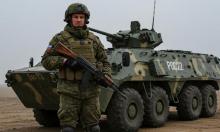Saddam trial to resume
The trial of Saddam Hussein on charges of crimes against humanity resumes on Monday with up to five witnesses expected to testify as the prosecution pushes ahead with a case criticised at home and abroad. Court officials prepared for the third session since the trial opened on Oct. 19 in the heavily fortified Green Zone government compound in central Baghdad, which once housed Saddam's own presidential palace complex.
There was some delay in the expected start time of 10 a.m. (0700 GMT), officials said. Security has been a major concern, not least since two defence lawyers have been killed, prompting last Monday's week-long adjournment to find replacements. Central Baghdad's streets were gridlocked by security measures. Iraq's national security adviser said on Sunday that a plot to rocket the courthouse had been thwarted when weapons were found in Baghdad, although he gave no details.
One of the foreign defence counsel allowed to take part said that, after meeting Saddam on Sunday, attorneys would again try to challenge the very legitimacy of the U.S.-funded court: "Our defence is focusing on the illegality of this court ... and the fact the court is not independent," Najeeb al-Nauimi, a former Qatari justice minister, told Al Jazeera television.
He said further adjournment was "very possible". He said the defence would object, however, if the court insisted on hearing witnesses before considering its challenge on legitimacy. "Witnesses ... should not be heard until procedural aspects of the case are heard," he said. "There is a determination to complete this trial and reach a verdict by next week." But a U.S. official familiar with the court said on Sunday he expected between three and five witnesses to give evidence this week, some with their identities concealed.
On the eve of its resumption, a member of the five-judge panel stood down citing potential conflict of interest because one of Saddam's co-defendants had been linked to the killing of the judge's brother, court officials said. An alternate judge will step into his place on Monday, the officials said.
The trial may go on for up to three days, with up to 11 witnesses appearing. Eight will have their identities concealed in one way or another, a practice that could raise doubt about the defence's access to witnesses. At the second court session held on Nov. 28, proceedings were adjourned for a week to give two of the eight defendants time to find new defence attorneys after two lawyers were assassinated and another fled the country in fear.
The U.N. representative for human rights in Iraq said on Sunday Saddam's trial would never meet international standards of fairness and transparency. "Weakness in the system of administration of justice, in addition to the antecedents surrounding the establishment of this tribunal, will never be able to produce the kind of process that would be able to satisfy international standards," John Pace told Reuters in an interview.
Former U.S. Attorney General Ramsey Clark, who joined Saddam's defence team at the last session, is expected to be allowed to appear in court even though paperwork concerning his application is still being reviewed. Previous Clark clients have included former Serbian President Slobodan Milosevic.
Further delays in the trial are expected ahead of Dec. 15 parliamentary elections.Saddam's defence team has already filed another motion declaring that, as former president, he has sovereign immunity and a third motion asking for more time to prepare. Chief judge Rizgar Mohammed Amin has not ruled on any of those motions, reports Reuters. I.L.
Subscribe to Pravda.Ru Telegram channel, Facebook, RSS!





